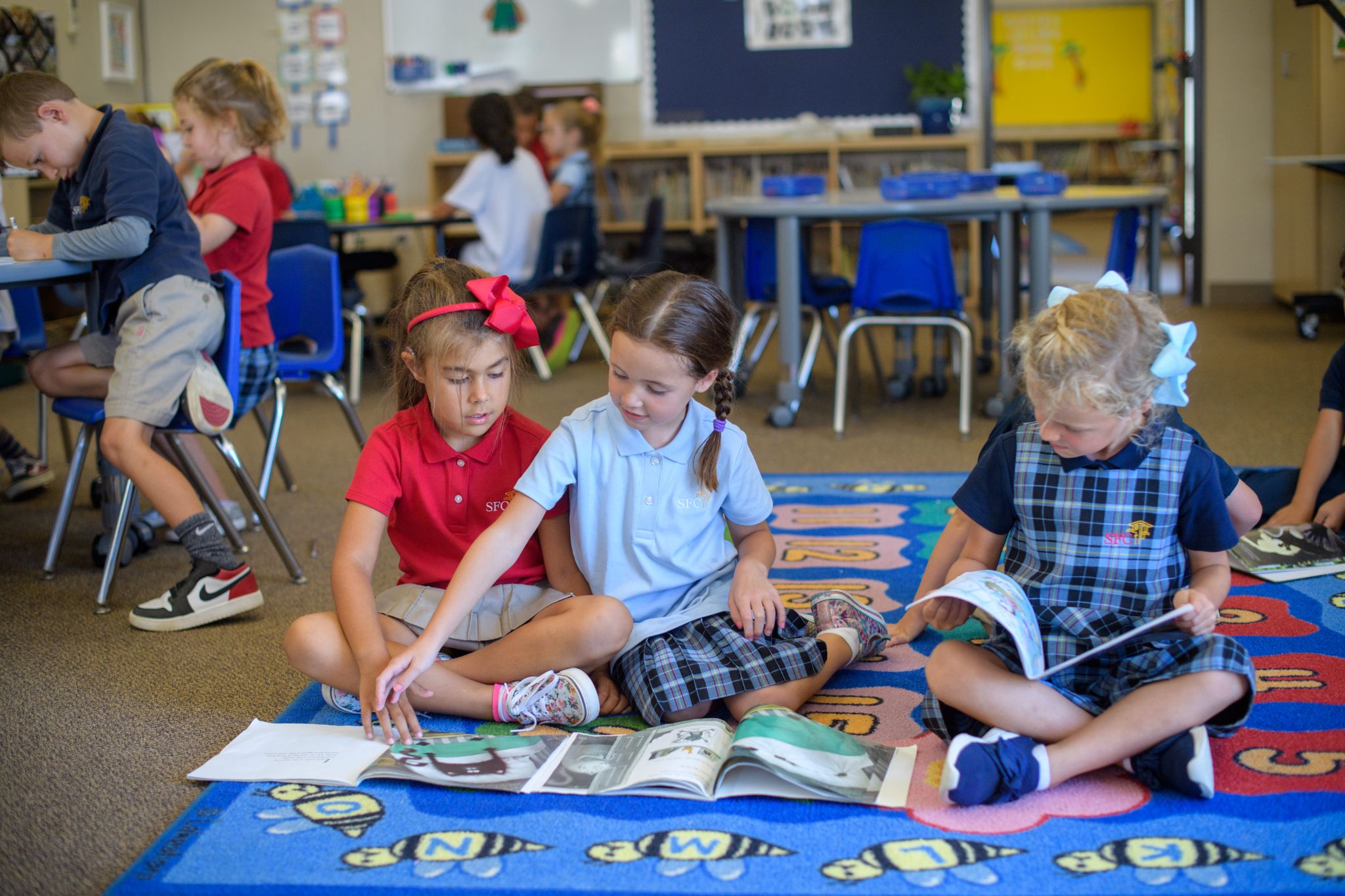Storytelling is one of the most valuable tools for encouraging the development of a child’s faith. From simple picture books to fables and fantasy novels, stories help foster connection, impart biblical truths, and nurture children’s consciences.
In a world full of hostile, counter-biblical influences on children, storytelling is a powerful aid to add to a parenting tool belt.
The Benefits of Reading Aloud to Children
Reading aloud with children allows parents to connect with them in new ways. While children learn from the behaviors and values their parents model to them, storytelling has a way of simplifying complex concepts like morality and virtue, making them easy to understand and internalize.
Amanda Walker, assistant Elementary School Principal, shares how reading aloud has given her unique opportunities to connect with her children. She credits this practice for allowing parents “to connect with your child and maybe have conversations you wouldn’t have otherwise, or skip off to fantasyland together.”
Characters in stories often face fearsome challenges and moral dilemmas. The predicaments in which these characters find themselves tend to spark conversations with children about heroic virtue, emotional processing, and morality. “There are so many themes that you can actually tie into faith and choices, friendship, honesty, integrity, and family,” Walker says about reading the Harry Potter series with her eldest children.
By actively participating in storytelling with their children, parents often receive invaluable insights into their development. Walker recalls a conversation with her first-grade daughter while reading a picture book together called Ruby Finds a Worry. “She stopped me, and she said, ‘Mom, that’s not what you’re supposed to do with a worry.’ I said, ‘Well, what are you supposed to do with a worry?’ She said, ‘You’re supposed to talk about it because then the worry gets smaller and smaller and smaller until it’s not really a worry anymore.’ I thought, ‘This is exactly the reason I want to sit here,’ because that’s what reading aloud with your child can build. It’s emotional literacy, an emotional vocabulary that they’re developing.”
Cautionary Tales Offer Parents a Platform to Discuss Important Life Lessons
In addition to creating beautiful memories with their children, stories can also allow parents to talk about important life lessons. Many parents struggle to impart wisdom gained from their own life experience, as children sometimes perceive their parents as unrelatable or out of touch.
Stories help overcome this obstacle “because, in a way, they’re not your morals; they’re the morals of the stories,” says Mike Siciliano, High School Dean of Students at SFC. By reading cautionary tales together, “we are, hopefully, saving them from having to learn the hard way by experiencing” those life lessons themselves, he adds.
Rod Gilbert, SFC’s Head of Schools, drives this point home. “There are lots of times where you could tell a child, ‘Don’t do X,’ and they’re not going to listen to you. But there is something about the magic of a story that attaches either a virtue or a vice that makes it very memorable.”
Cautionary tales stimulate young children’s imaginations, aiding in the development of emotional literacy early on. “For little impressionable ones, they get to experience the damage of bad choices through a really fantastical story,” Gilbert shares. “That creates imprints in their souls to help cultivate what it means to choose virtue over vice.”
One of the most famous cautionary tales, Pinocchio, is a shining example that highlights the consequences of telling lies. When Pinocchio lies, Walker says it’s clear to children that “Pinocchio shouldn’t do that or make that choice. It’s so clear. But then in their own lives, when they come across things, it’s not as clear.” By reading a story like Pinocchio with their children, parents can help facilitate their understanding and help them apply the same moral principles to their own lives.
Siciliano says this is a “beautiful gift for them, even if they don’t appreciate it at the time.”
Fantasy Books Highlight Important Biblical Parallels
Many fantasy books contain motifs that directly parallel those in the Bible. When parents read fantasy books with their kids, it stimulates the children’s imaginations in ways that consolidate these crucial messages.
Pinocchio, for example, contains the biblical theme of love and respect for one’s parents. Gilbert mentions, “There’s a desire of the boy to be ultimately respectful and caring for his father.” He goes on to say, “In today’s world where the family unit is under quite a bit of attack, the emphasis on this biblical understanding of the family is quite beautiful.”
Still, some parents worry that sharing fantasy stories with their children may be detrimental. Siciliano points out, “In some Christian communities, there’s a concern or a fear that elements of magic or imagination are counterbiblical or might be hurting kids’ acceptance of the gospel.”
But by accompanying children through these fantasy worlds, parents can “give them a dose of the wide range of the universe in age-appropriate ways and be the person they can soundboard it with,” Gilbert counters. “Because if everything’s avoidance, then what you really create are fantastical taboos.”
Storytelling creates a safe environment for children to use their God-given creativity and imagination. In this way, children come to understand the reality of good and evil. Walker reiterates that “exposing them to what that looks like in all different forms, fantasy and otherwise, is really healthy.”





